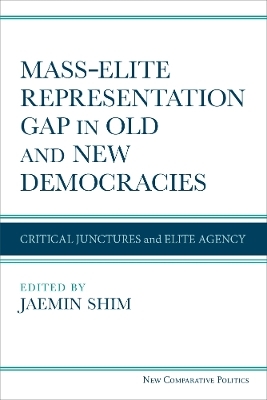
Mass–Elite Representation Gap in Old and New Democracies
The University of Michigan Press (Verlag)
978-0-472-05694-1 (ISBN)
- Lieferbar (Termin unbekannt)
- Versandkostenfrei
- Auch auf Rechnung
- Artikel merken
The alignment of voter preferences and the preferences of their parliamentary representatives has long been understood as a vital part of representative democracy. However, recent decades have seen a considerable increase in such gaps between mass (the public) and elite (the representatives) policy preferences, appearing not just as isolated or single-topic issues, but rather across the spectrum of political dimensions. The negative effects can include decreased trust and voter engagement, dissatisfaction with democratic ideals and process, and even democratic backsliding.
Mass–Elite Representation Gap in Old and New Democracies brings together a global array of scholars to examine the issue from new angles, drawing on evidence from North Africa, East Asia, Southeast Asia, South America, and Europe. This global-level analysis of different representation gaps demonstrates that these gaps vary in content, structure, and the timing of formation. Moreover, recognizing the socially, culturally, and internationally embedded nature of party politics, the contributors in the volume trace the historical origin of gaps observed in different world regions. The findings show that earlier choices made by political elites during historical-critical junctures lead to preference mismatch, undermining the quality of democratic representation.
Jaemin Shim is Assistant Professor at Hong Kong Baptist University and Associate Fellow at the German Institute for Global and Area Studies.
Introduction
1. Global Mass–Elite Discrepancy: An Introduction
Jaemin Shim
Part I. Varieties of Mass–Elite Discrepancy: Global and EU-Level Conceptualization
2. Fifty Shades of Mass–Elite Discrepancy: Varieties of Political Dimensions and Discrepancy Forms
Jaemin Shim
3. European Integration and Its Different Guises across Europe: A Sub-dimensional Perspective on Mass–Elite Discrepancy
Andrea Pareschi, Gianfranco Baldini, and Matteo Giglioli
Part II. Theorizing Causes behind Mass–Elite Discrepancy in Old and New Democracies
4. Shadow of a Critical Juncture: Asymmetric Politicization and Elite Agency
Jaemin Shim
5. Polarization, Political Cleavages, and Elites in Old and New Democracies
Simon Bornschier
Part III. Critical Junctures and Mass–Elite Discrepancy: Religious and Foreign Policy Issues
6. Mass–Elite Religious-Secular Discrepancy in Tunisia: The Revolution as a Critical Juncture
Mahmoud Farag
7. Lost in Translation? Re-democratization and Mass–Elite Discrepancy in Indonesian Politics
Andreas Ufen
8. Mass–Elite Discrepancy over Foreign Policy: Constitutional Revision in Japan
Kenneth McElwain
9. Domesticizing Foreign Policy? The Opportunistic Engagement of Bulgarian Elites with Mass Attitudes on EU Integration
Petar Bankov and Sergiu Gherghina
Conclusion
10. Conclusion: What the Book Does and What Further Research Might Follow From It
Stephen Whitefield and Robert Rohrschneider
Author Bios
| Erscheinungsdatum | 21.08.2024 |
|---|---|
| Reihe/Serie | New Comparative Politics |
| Zusatzinfo | 16 figures, 21 tables |
| Verlagsort | Ann Arbor |
| Sprache | englisch |
| Maße | 152 x 229 mm |
| Themenwelt | Recht / Steuern ► Allgemeines / Lexika |
| Recht / Steuern ► EU / Internationales Recht | |
| Sozialwissenschaften ► Politik / Verwaltung ► Politische Theorie | |
| Sozialwissenschaften ► Politik / Verwaltung ► Staat / Verwaltung | |
| Sozialwissenschaften ► Politik / Verwaltung ► Vergleichende Politikwissenschaften | |
| ISBN-10 | 0-472-05694-8 / 0472056948 |
| ISBN-13 | 978-0-472-05694-1 / 9780472056941 |
| Zustand | Neuware |
| Haben Sie eine Frage zum Produkt? |
aus dem Bereich


